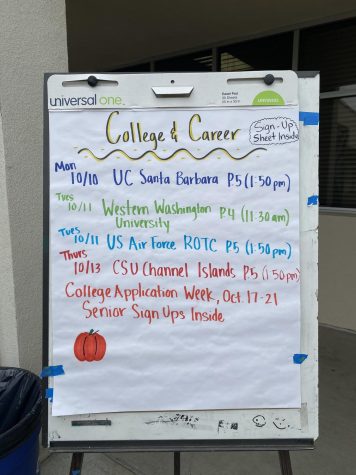For and against: Community college vs. four-year universities
Pennants of various colleges and universities can be seen inside the College & Career Center. These pennants include both in-state schools and out-of-state schools. Photo by: Katie Rundle
November 18, 2022
A debate on whether going to a community college or a four-year university is the better option
Community college: by Jocelyn Wood
Community college is something accessible to everyone, and that’s one of the best things about it. It’s available for all people, and there are plenty of ways to get to go for free, depending on your area. Some people may see community college as a backup plan and not a number one option, but it’s definitely a great option.
College & Career Counselor Patricia Roberts said, “I’m a huge fan of community college. I’m a product of community college; I went to Santa Barbara City College before I transferred to [a] Cal State.”
Community colleges have the perk of being affordable and at a lower price where you can still get the same experiences as a four year. The only negative of it is that you’ll miss out on living in the dorms in your freshman year. Even with going to a community college, you will still get to meet new people and learn new things. A lot of times, there will still be great opportunities for one to try and excel in the future.
Roberts said, “The state has put in place a lot of things to help students finish in just two years and then transfer to meet their goals. There’s now a lot of incentive for the community colleges to get you in there and get you what you need in order to transfer.”
Community college can even be a great place to start before going to a four-year university right away. Community colleges can help with getting into a four-year, and there’s even a chance that you could get ahead of your peers.

Although going to a four-year university can get you different experiences from going to a community college, you’ll still end up making memories, learning and getting that degree. Community college is a great option for anyone who is unsure of what they want to do. Why waste money on a four-year university when you’re not even sure what you want to major in? As I stated earlier, it’s way more affordable than a four-year as well. You can choose whether or not you stay with your parents, which could help you with saving money, and a plus is still getting to have home-cooked meals.
Esja Moore ‘23 said, “I think that community college is great for some people. It’s definitely less costly or free and so it’s a great way to start your college experience because you don’t have to worry about money as much as going to a four-year.”
Community colleges are a great option for everyone and more people should consider attending one. It can offer great education opportunities and can help students get into the colleges of their dreams.
Four-year universities: by Katie Rundle
Universities are costly. Tuition often ranges from a low of thirteen thousand dollars a year to a high of sixty or seventy thousand dollars, with big-name schools such as USC and NYU boasting a price tag that promises student debt and large loans. Despite this knowledge, Ivy League universities such as Yale and Harvard still receive thousands of applications from hopeful scholars every year, as do private institutions like the ones previously mentioned. If the promise of financial burden is not enough to deter students from attending these schools, then what are the appeals that make such a bleak outcome worthwhile?
Jasmine Bruns ‘23 said, “[A community college] is not a four-year, so you may not get the same opportunities you would get if you went to a four-year. The pros [of going to a university right out of high school] are moving away, making new experiences, meeting new people and that you can major in something and take it more seriously.”
Bruns mentioned something crucial — opportunity and new experiences. Attending a community college close to home can be viewed as both a positive and a negative, as one is closer to family/friends but is often surrounded by the same people they went to high school with or at least recognize. As a result, one is not thrust into the anxiety-filled yet prospective environment that defines freshman year at a four-year university. Additionally, one might miss out on making connections by going to a community college since they will only have two years to network at whatever university they transfer to. Although one still has the opportunity to network at a community college, universities are more likely to provide significant internships and experiences aiding in one’s development of their career.
The differences between the quarter and semester systems must also be taken into account. One quarter in the quarter system is 10 weeks long, with an average of three to four classes being taken during those 10 weeks. In contrast, the semester system (which UC Berkeley, along with most private schools follow) consists of two semesters, with each semester being 15 weeks long and an average of four to five classes being taken. The quarter system allows one to take more classes than they would be able to take on the semester system, therefore encouraging exploration of many different areas of study/interests a student may have. However, it also moves much faster than the semester system, with each course essentially being a usual semester class condensed into a quarter’s time. Thus, it does not forgive those who fall behind and demands great time management skills as well as rigor from its students.
Santa Barbara City College and all of the Ventura County community colleges follow the semester system, providing an easier transition from high school to college but allowing more opportunities to slack off as well. One can get away with falling behind and catching up last minute at a community college far more easily than they could at a UC school, thus enabling students to continue with previously-built habits of procrastination that would not be tolerated by a fast-paced quarter system. While time management ultimately falls into the hands of the individual, one must consider the benefits and shortcomings of adjusting to a demanding schedule during their freshman year of university versus their junior year if thinking about attending a UC besides Berkeley.

Sofia S’gro ‘23 said, “[Community college] is definitely very lonely from what I’ve seen, and you don’t have the community, like sororities or frats or parties.”
As S’gro mentioned, sororities and frats are key social aspects that students are likely to miss out on when transferring from a community college to a four-year university. Although students can still join a frat or sorority their junior year, the people being initiated at the same time as them are typically freshmen and so they may feel disconnected due to the different stage of life each group is in. A freshman at a university is just being introduced to the possibilities open to them, while a junior must commit to a major and is likely more focused on their future career/internships since graduation is much closer for them. As a result, a transfer student may not even have time for the initiation process common to fraternities or sororities that a freshman student would. Even if they did, they would have significantly less time (two years rather than four) with their Greek life brothers or sisters than they would as a first-year university student.
Ultimately, it is up to the individual to make the decision that they feel is both financially and educationally best for them. Community college is an ideal option for saving money and transfer acceptance rates are often much higher than freshman acceptance rates, allowing one a second chance to be admitted to a university they may have been previously rejected from. However, it would also be amiss to ignore the shortcomings of attending a community college. One is less likely to meet new people if enrolling in classes close to home, and the semester system can further negative habits like procrastination or poor time management. Community college students also miss out on two years of Greek life (fraternities and sororities) or other social opportunities specific to four-year universities. One must keep all these factors in mind when weighing the pros and cons of attending a four-year university right away in order to make an informed and hopefully not regretted choice regarding their future.









![Lindsay Guzik, new assistant principal said, "I am settling in [at VHS] pretty well. I know a lot of the students, so that makes it a little bit easier coming from Cabrillo, and it's been nice to see them all grown up." Photo by: Abraham Kassa](https://thecougarpress.org/wp-content/uploads/2025/09/IMG_9728-300x200.jpg)
